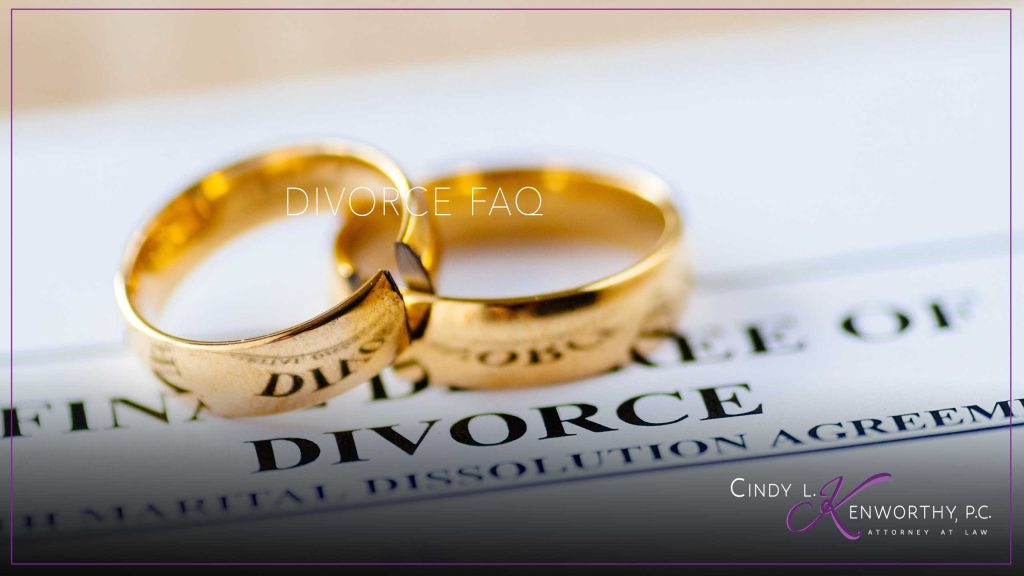Divorce FAQs
Divorce can be challenging to navigate. Even if your divorce is amiable and uncontested, there are still many things that can be confusing or difficult to understand.
At Cindy L. Kenworthy, P.C., we are here to offer you the support you need during this trying time. Our divorce FAQs page can provide you with some thoughts on issues involving divorce. Because divorce issues are complicated, help from an attorney is needed. If you need help, please don’t hesitate to reach out for a consultation. You can contact us online or give us a call at 317-298-2525.
How do I file for divorce in Indiana?
 Each state has its own requirements for filing for divorce. In Indiana, before you can file, either you or your spouse must meet the state’s residency requirements. This means one of you must have lived in Indiana for at least six months before you can file the divorce petition. One of you must also have lived in the county where you are filing for at least three months.
Each state has its own requirements for filing for divorce. In Indiana, before you can file, either you or your spouse must meet the state’s residency requirements. This means one of you must have lived in Indiana for at least six months before you can file the divorce petition. One of you must also have lived in the county where you are filing for at least three months.
If these requirements are met, you can submit a Petition for Dissolution of Marriage to the appropriate court in your county. If any children are involved in the divorce, you must also submit a Child Support obligation worksheet.
What are considered grounds for divorce?
Indiana is a no-fault divorce state, meaning you do not have to provide a reason for the divorce other than stating that the marriage is “irretrievably broken.”
 However, statutory law recognizes the following grounds:
However, statutory law recognizes the following grounds:
- Your spouse was convicted of a felony after you were married
- Your spouse is impotent at the time of marriage
- Your spouse has suffered from incurable insanity for at least two years
If you intend to provide one of the three grounds for divorce listed above, you will be required to provide evidence as proof. For this reason, many people simply choose the no-fault divorce option because claiming the marriage is irretrievably broken does not require you to provide any evidence as proof.
How long does it take to get divorced?
 Divorce is typically a lengthy process, and each case is unique to the individuals involved and their circumstances. As such, there is no estimated time frame for these kinds of cases.
Divorce is typically a lengthy process, and each case is unique to the individuals involved and their circumstances. As such, there is no estimated time frame for these kinds of cases.
Numerous factors can and do play a role in how long a divorce takes, such as whether it’s contested or uncontested, whether you are working with a lawyer that is helping adequately prepare you, and whether you and your spouse can easily reach an agreement.
There is also a required waiting period that must occur after you file the divorce petition. In Indiana, the court cannot sign off on your divorce for at least 60 days after you have filed your petition.
How is property divided in a divorce?
Indiana abides by equitable property division laws. This means that when determining who gets what property, the court will divide property in a way that is fair but not necessarily equal, as fair and equal are two different things.
For example, if one spouse earns more money than the other, then it might be fair for the one who earns less money to receive more of the property to make up for the difference in income. This is considered an equitable division rather than a 50/50 equal split.
Various factors help the courts decide how this equitable division of property will work.
Those factors include, but may not be limited to:
- Each spouse’s contribution when acquiring the property
- The economic circumstances of each spouse
- Each spouse’s income
- If one spouse made non monetary contributions, such as homemaking or childcare
- If one spouse misused money and assets
- Whether one spouse should get certain assets — such as the house — if they are to be the primary custodian of the children
Do I have to get a legal separation before getting a divorce?
No. Some states require couples to live separately for a set period before they are allowed to file for divorce. However, Indiana does not follow this rule. That said, depending on where you live, the court may have other requirements before granting your divorce, such as mediation.
What is the difference between contested and uncontested divorce?
Generally speaking, divorces fall into two initial categories: contested and uncontested.
 Contested: A contested divorce simply means that the divorcing couple does not agree on how to resolve an issue. When this happens, mediation or a trial will need to happen until the couple can reach an agreement.
Contested: A contested divorce simply means that the divorcing couple does not agree on how to resolve an issue. When this happens, mediation or a trial will need to happen until the couple can reach an agreement. - Uncontested: An uncontested divorce is one where there is no disagreement or dispute on any of the issues. This typically means that the couple agrees on how to resolve all issues. In this case, there is no need for a trial or mediation, which means the divorce will likely move much faster and be more affordable.
What is divorce mediation?
As mentioned above, if a divorce is contested, the couple may be required to participate in mediation before the marriage will be dissolved by the court. Mediation is a form of dispute resolution. It is a more private process than going to trial and involves a neutral third party who helps the couple resolve their disagreements.
Can I modify divorce orders after they are issued by the court?
 Once an agreement is reached and transcribed into a Decree of Dissolution of Marriage, it will be approved by the court, the Decree’s provisions are the law of the case and governs the issues reflected in its provisions. However, if the divorce decree becomes ineffective for some reason, such as circumstances changing, Indiana does allow modifications to the decree.
Once an agreement is reached and transcribed into a Decree of Dissolution of Marriage, it will be approved by the court, the Decree’s provisions are the law of the case and governs the issues reflected in its provisions. However, if the divorce decree becomes ineffective for some reason, such as circumstances changing, Indiana does allow modifications to the decree.
If one or both parties involved desire modifications, a petition must be filed and any agreed upon modifications approved by the court. Changing the provisions of a divorce decree is considered a serious matter, so the court will carefully evaluate the desired changes to determine if they agree or not.
What is spousal maintenance?
 In general, spousal maintenance is a form of financial support that the court requires one spouse to pay the other. This is typically needed when one spouse has a superior income and the other needs financial assistance. There are three types of spousal maintenance: temporary spousal maintenance which lasts only as long as the dissolution of the marriage case is pending before the Court, rehabilitative spousal maintenance, and permanent spousal maintenance.
In general, spousal maintenance is a form of financial support that the court requires one spouse to pay the other. This is typically needed when one spouse has a superior income and the other needs financial assistance. There are three types of spousal maintenance: temporary spousal maintenance which lasts only as long as the dissolution of the marriage case is pending before the Court, rehabilitative spousal maintenance, and permanent spousal maintenance.
What documents do I need to provide to my attorney?
Certain documents and records may help in preparing your case for filing and later for mediation or trial. It’s very helpful to bring these documents to your first meeting with your divorce lawyer to help speed up the process.
Such documents include:
- Prenuptial or separation agreements
- Federal and state income tax records
- Payroll statements (proof of income and how much you make)
- Checking or savings account records
- Real estate deeds or leases
- Investment or retirement plan documents
- Insurance policies
- Mortgages
- Loans
- Credit card statements
- Monthly household expense records
- Business records (tax returns, financial statements, shareholder agreements, insurance policies, contracts, etc.)

Cindy L. Kenworthy, P.C. — Divorce Lawyer in Indianapolis
At Cindy L. Kenworthy, P.C., we aim to develop a strategy tailored to your individual needs and desired outcomes. With more than 30 years of experience handling complex legal cases, Cindy L. Kenworthy, P.C. can help you get through your divorce, ensuring the best possible outcome.
If you are ready to move forward with your divorce, reach out today for a consultation or give us a call at 317-298-2525.

